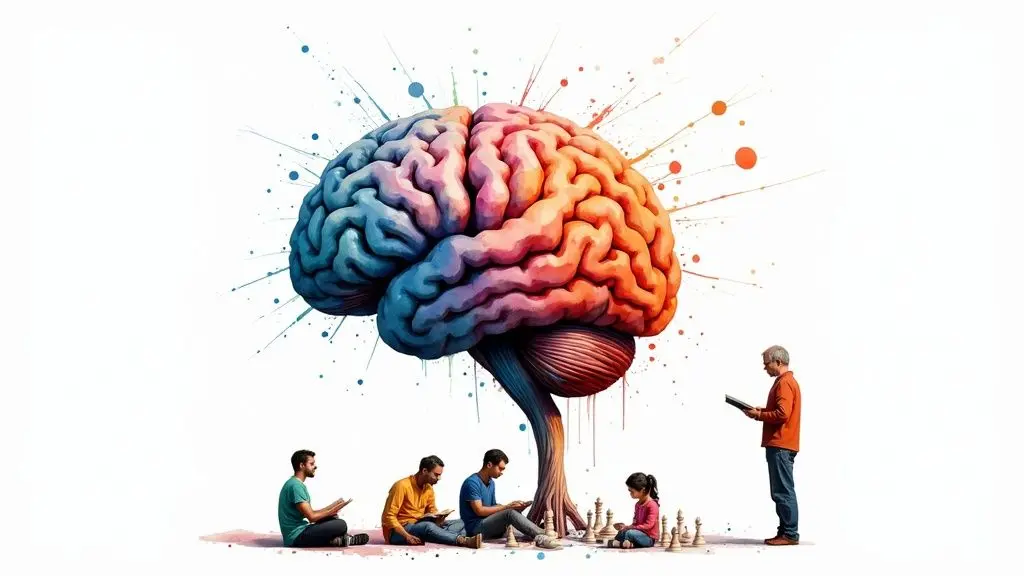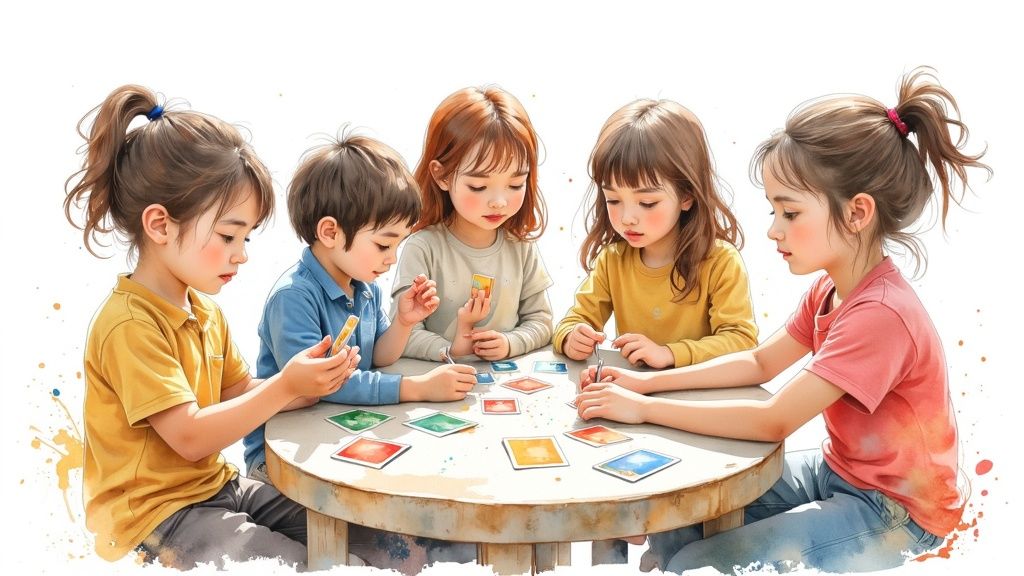Age-Defying Cognitive Development Activities: Your Complete Science-Based Blueprint
February 3, 2025

Understanding the Science of Cognitive Enhancement

The human brain is an incredible learning machine that never stops growing and changing. Our cognitive development - how we learn, think, and understand - continues throughout our entire lives, affecting everything from our memory to how we solve problems. Getting to know how this process works helps us take an active role in strengthening our mental abilities.
The Building Blocks of Cognition
Scientists have discovered that our brains remain flexible and adaptable well into adulthood. This remarkable ability, called neuroplasticity, means we can pick up new skills at any age. Our brain's development depends on several key factors - our genetic makeup, our environment, and what we do day to day. When we challenge ourselves with something new, like studying a foreign language, our brains physically change by creating stronger connections between neurons.
Cognitive Activities and Their Impact
Regular mental exercise works much like physical exercise for the brain. Every time we tackle a challenging puzzle, read a complex book, or master a new skill, we're creating new pathways in our brain. The more varied these mental workouts are, the better our brains become at handling different types of challenges. For instance, combining creative activities with analytical ones helps build a more versatile mind. Read also: Proven Art Therapy Activities for Anxiety & Creative Healing.
The Rise of Digital Literacy
Technology has opened up new ways to keep our minds sharp and engaged. Being able to effectively use and understand digital tools has become a crucial skill for modern life. Recent research shows growing interest in this field - the number of published studies about digital literacy jumped from 68 articles in 2017 to 138 articles in 2022. This research helps us better understand how technology affects our thinking and learning abilities. You can find more detailed statistics here.
When we understand how our brains learn and grow, we can make better choices about which activities will help us stay mentally fit. This knowledge gives us the tools to keep our minds strong and active throughout our lives, leading to richer experiences and better mental wellbeing as we age.
Turning Fun Activities Into Brain Training

You don't need special brain training apps or complex mental exercises to boost your cognitive abilities. The fun activities you already enjoy can strengthen your mind in meaningful ways. Whether you're diving into a good book or catching up with friends, these everyday moments can build better brain health when approached mindfully.
Simple Activities With Big Benefits
Think about what you like to do in your spare time. Maybe you lose yourself in novels, strategize over chess matches, or chat for hours with friends. These enjoyable pastimes engage your brain in powerful ways. Reading immerses you in new worlds while building vocabulary and memory. Strategy games put your problem-solving and critical thinking skills to work. Even casual conversations exercise multiple mental muscles at once.
Mix and Match for Maximum Impact
While any single activity helps, combining different types of mental engagement gives you the best results. Just like your body needs varied exercise, your brain thrives on diverse mental workouts. For example, try pairing an artistic hobby like drawing with a numbers game like Sudoku. Or follow up social time with quiet reading. This variety ensures you're developing different cognitive skills rather than just one.
What Research Shows
Studies confirm that leisure activities meaningfully impact brain function, particularly as we age. Recent research published in Frontiers in Psychology looked at 2,344 older adults in China. The findings showed that people who regularly engaged in mentally stimulating hobbies maintained stronger cognitive abilities over time. This adds to growing evidence that everyday activities can protect and enhance brain health.
Make It Work For You
The key is choosing activities you truly enjoy and making them part of your regular routine. Consider learning that language you've always wanted to speak, joining a local book club, picking up a musical instrument, or simply spending more quality time with family and friends. When you find ways to challenge your brain that feel rewarding rather than like work, you're more likely to stick with them for the long run. Small daily actions add up to lasting positive changes in how your mind works.
Creating Your Personalized Brain Training Blueprint

Everyone's brain works differently, which is why one-size-fits-all brain training often misses the mark. Taking time to build a personalized plan that matches your needs, schedule and interests makes all the difference. Here's how to create a brain training approach that actually works for you.
Assessing Your Cognitive Landscape
Start by taking an honest look at your mental strengths and challenges. Maybe you excel at spatial puzzles but struggle to remember names at parties. Or perhaps you can recall movie quotes perfectly but find it hard to focus during long meetings. Write down specific areas where you'd like to improve - this helps guide your training choices. Consider practical factors too, like what times of day you're most alert and how much time you can regularly set aside.
Selecting the Right Cognitive Development Activities
Now comes the fun part - choosing activities that you'll actually stick with. The options are endless: crosswords, language apps, chess, dance classes, memory games, or even learning to juggle. Pick things that genuinely interest you, not just what you think you "should" do. Read also: How to Master Creative Thinking Exercises to Unlock Innovation Potential. When you enjoy the process, you're more likely to keep at it and see real progress.
Building Your Brain Training Schedule
Regular practice is essential for building cognitive skills. Set up a realistic schedule that fits your life - maybe it's 15 minutes of Spanish practice over morning coffee, or a weekly chess game with friends. Mix up your activities to work different mental muscles. Research backs this up: A study of 206 older adults showed that combining various mental, social and physical activities helped maintain brain function with age. Learn more about this research here. Just be sure your brain training enhances rather than overwhelms your daily routine.
Tracking Progress and Staying Motivated
Keep tabs on your brain training journey. A simple notebook works great for logging activities and noting improvements - like finishing crosswords faster or remembering more items from your shopping list. Regular check-ins help you spot what's working and adjust your approach when needed. Celebrate small wins along the way. This kind of mindful practice turns brain training from a chore into a rewarding habit that supports lifelong learning.
Using Digital Tools to Boost Brain Power

The growth of technology has opened up new ways to train and challenge our brains. From memory-building apps to immersive VR experiences, digital tools can work alongside traditional methods to make learning more engaging and accessible. But making smart choices about which tools to use - and how to use them effectively - is key to seeing real benefits.
Brain Training Apps: What Actually Works?
The market is full of apps claiming to boost your mental abilities, but quality varies widely. Many apps offer basic games that don't deliver meaningful cognitive benefits. Others provide scientifically-designed programs that target multiple mental skills at once. The most effective apps adapt to your performance and get progressively more challenging as you improve. Research shows that consistent practice with well-designed apps can lead to measurable improvements in memory and focus.
Virtual Reality: A New Frontier for Brain Training
VR technology brings fresh possibilities for developing cognitive skills. By creating realistic 3D environments, VR lets you practice real-world situations safely. Someone working on public speaking can give presentations to virtual audiences. People learning new skills can practice in simulated workspaces. The immersive nature of VR makes learning feel natural and engaging, which helps with retention and practical application.
Making Technology Part of Your Mental Fitness Plan
Digital tools make it simple to fit brain training into busy schedules, but they work best as part of a balanced approach. Reading books, solving physical puzzles, and having face-to-face conversations remain essential for overall mental fitness. For example, you might use a meditation app in the morning, tackle crossword puzzles at lunch, and join an evening book club discussion. This mix of digital and traditional activities provides comprehensive mental stimulation.
Smart Ways to Use Digital Brain Training
Follow these guidelines to get the most from brain training technology:
- Start with clear goals: Pick specific skills you want to improve and track your progress over time
- Focus on quality: Choose 2-3 high-quality apps rather than jumping between many different options
- Measure your results: Use the tracking features in apps to monitor improvements and adjust your training
- Mind your screen time: Take regular breaks from devices and balance digital activities with offline mental exercises
By following these principles, you can use technology effectively to support your brain health goals. The key is finding the right mix of digital and traditional activities that works for your lifestyle and learning style.
Harnessing the Power of Social Brain Training
Our minds flourish through social connections. When we interact with others, we're not just having fun - we're actively building stronger cognitive abilities. Let's explore how group activities can both boost our brain power and help us build meaningful relationships.
The Social Brain: A Hub for Cognitive Growth
Human brains are naturally designed for connecting with others. Each social interaction engages multiple mental processes - from reading facial expressions and body language to understanding different viewpoints and participating in complex discussions. These daily social exchanges essentially provide a natural workout for our minds, improving our ability to think critically, find solutions, and handle new challenges.
Group Activities: Cognitive Development Activities That Connect
Research shows several group activities are particularly effective at combining social interaction with mental stimulation:
- Book clubs: Reading and discussing books helps sharpen critical thinking and memory while creating lasting friendships
- Team games: Activities like bridge, chess, or charades build strategic thinking and communication skills
- Group classes: Taking a cooking class, learning a language, or trying pottery lets you gain new skills alongside others. You might be interested in: Powerful Group Art Therapy Ideas: Evidence-Based Activities
- Volunteer work: Helping others provides social connections while exercising problem-solving abilities
Building a Supportive Network for Cognitive Health
A strong social circle does more than provide companionship - it actively promotes brain health. Spending time with people who challenge your thinking, share different perspectives, and offer emotional support can significantly boost your cognitive wellbeing. These connections also help keep you motivated and accountable as you work on your mental fitness goals.
Social Engagement in a Digital World
You don't need to be physically present to maintain meaningful social connections. Online tools have made it easier than ever to stay in touch. Video calls, discussion forums, and social platforms all provide ways to engage with others mentally and emotionally, even from a distance.
Finding and Creating Opportunities
Most communities offer plenty of ways to combine social interaction with mental growth. Check your local senior centers, libraries, and community colleges for group activities. Can't find what you're looking for? Create your own opportunities - start a book club, host regular game nights, or join a volunteer group. Taking the first step to build these social connections can make a real difference in keeping your mind sharp and engaged.
Measuring Success and Maintaining Momentum
Building better cognitive skills takes dedication and a clear way to track your progress. By measuring improvements and adjusting your approach over time, you can see real results and stay motivated for continued growth.
Assessing Your Cognitive Gains
It's important to know if your brain training is actually making a difference. While some changes feel subtle, concrete measurements help show your progress. Standardized cognitive tests give you a baseline and track improvements in key areas like memory, focus, and mental processing speed. You can also monitor your performance in specific activities - for example, timing how quickly you complete puzzles or counting new vocabulary words mastered each week. A beginner Spanish learner might track monthly word counts, celebrating as their vocabulary grows from 100 to 500 words.
The Importance of Progress Tracking
Keeping a simple journal makes a big difference. Write down what brain training activities you do and any day-to-day improvements you notice. You might find you're remembering names better, staying focused longer during work, or picking up new skills more easily. This personal record connects your practice to real benefits and helps motivate you to keep going. Together with test scores, your observations paint a full picture of your mental growth.
Staying Motivated and Adapting Your Approach
Like any long-term goal, celebrating small wins helps maintain momentum. Take time to acknowledge your progress, no matter how minor it seems. Be ready to adjust your activities as you improve - what challenged you at first may become too easy. Just as you'd increase weights at the gym, try harder mental exercises to keep growing. If basic Sudoku puzzles become simple, move up to expert grids or try complex strategy games.
Overcoming Plateaus and Embracing Lifelong Learning
Getting stuck at a certain level is normal. When progress slows down, don't get discouraged. Try mixing up your activities, changing your schedule, or joining a study group for fresh motivation. Remember that improving your mind is a lifelong journey. Taking on new challenges and finding opportunities to learn keeps your brain sharp and engaged while supporting your overall wellbeing.
Want to create personalized learning experiences that spark curiosity and joy? ColorPageAI lets you instantly generate unique coloring pages about any topic. Whether you're exploring ancient civilizations, discovering scientific concepts, or seeking creative inspiration, ColorPageAI makes learning fun and engaging. Start creating with ColorPageAI today!
Ready to start coloring?
Join ColorPage.ai today and get 5 free credits to create your own custom coloring pages!
Start creating